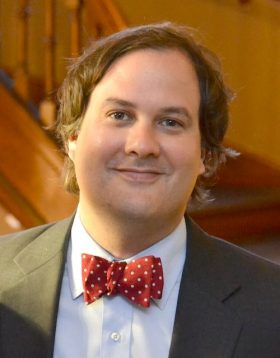Assistant Professor of Law Enrique Armijo has taken on an advocacy role at an international level through his freedom of expression work in Rwanda, Jordan, Yemen and other countries throughout the Middle East and South America. His most recent work is in Myanmar (Burma), which is in the midst of democratic reforms after 50 years of oppressive military rule.

Armijo’s work in Myanmar, undertaken for the U.S. Department of State, has included drafting and advising on new press laws and communication-related legislation. In furthering this work, he has investigated the media environment, interviewed key stakeholders in the Myanmar government and media, and met with journalists and other interest groups in the region. In Myanmar, the operation, publication and distribution of private, daily newspapers had been illegal until just a few months ago. According to Armijo, the freedom to speak drives self-governance even though that process can be slow.
“If there is more freedom of speech today than yesterday, then a country and its people will be closer to political and personal self-determination than they were the day before,” said Armijo.
Closer to home, Armijo’s research on U.S. law focuses on the area of prior restraint. Armijo’s forthcoming paper, “Going Once, Going Twice: The Dubious Legality and Necessity of North Carolina’s Auctioneer License Statute,” will be published in the North Carolina Law Review in fall 2013. The article discusses government restrictions on the speech of auctioneers in the form of a licensing requirement. Although the government’s intent in criminalizing the calling of an auction without a license is to keep fraud out of auctioning, Armijo maintains that the state has other, less speech-restrictive ways to do so, and that the auction industry has long practiced self-regulation to protect buyers, potential buyers and sellers from fraudulent practices.
“This has occurred for as long as there have been auctions, from tobacco auctions in the 1800s here in the South to eBay,” said Armijo.
Armijo’s current research project looks at government provision of digital speech spaces such as municipal Wi-Fi connections, Internet access in public spaces and related technology, and how the First Amendment protects citizens using those spaces to communicate—in particular whether and when it is acceptable for the state to block content or people from these spaces. His article on these issues, “Kill Switches, Forum Doctrine, and the First Amendment’s Digital Future,” will be published in the winter 2014 issue of the Cardozo Arts and Entertainment Law Journal.
“Technology drives innovation in free speech law,” said Armijo. “These issues have become increasingly important and, as the law is always behind technology, we need to help the law keep up.”
In addition to First Amendment, media law and constitutional law, Armijo teaches torts to Elon’s 1L class.
“It’s an easy subject matter to make interesting and engage first-year students,” said Armijo. “You can make the cases and issues come alive.”
Armijo prefers for his students not to just sit back and listen, but to think hard about what the law should be and why it should be that way—especially about any weaknesses in court opinions and, more importantly, their own arguments.
“That’s what their adversaries will be doing once they get out into law practice. It’s critical for them to learn to identify the weaknesses in what they say and think and determine how to address those weaknesses. That’s what preparing for a life in the law is all about.”


